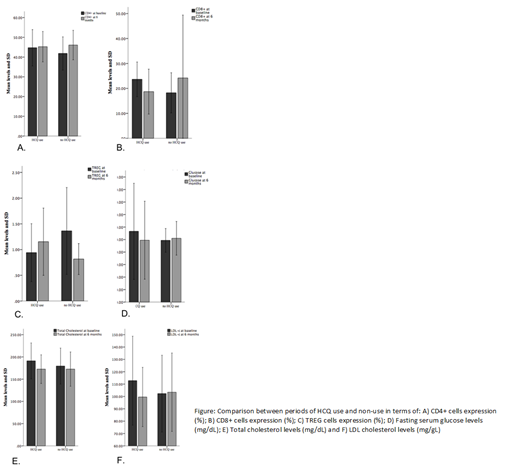Aim: Hydroxychloroquine (HCQ) could form an alternative treatment for thrombotic primary antiphospholipid syndrome (t-PAPS) if HCQ is proven to reduce the risk of thrombosis. We investigated whether HCQ affects immune response and lipid metabolism in t-PAPS.
Methods: HCQ at 400mg/day was given to anticoagulated t-PAPS patients for 6 months. After HCQ withdrawal and a wash-out period of 6 months, the same patients were followed for further 6 months. Blood samples taken at baseline and at the end of each 6-months follow-up period were analyzed employing flow cytometry and biochemical assays.
Result: Twenty-seven patients were included, mean age was 44 years, 78% were female, 44% had hypertension, 44% dyslipidemia, 7% diabetes, 77% had venous thrombosis, 30% arterial thrombosis and 33% recurrent thrombosis. Triple aPL positivity was detected in 37%. Lymphocyte counts decreased during HCQ use (mean change -318/mm3; 95%CI -438 to -198) and were not changed during non-HCQ use period. CD8+ and CD4+ cells decreased during HCQ treatment and remained unchanged during non-treatment period. In contrast, TREG (FoxP3+) cells increased during HCQ treatment (mean change 0.2U; 95%CI 0 to 0.4) and decreased in the period of non-HCQ treatment (mean change -0.6U; 95%CI -0.9 to -0.1). Serum glucose, total cholesterol and low density lipoprotein cholesterol decreased during HCQ use (7%, 9% and 12% respectively) and did not change substantially during non-HCQ period.
Conclusion: HCQ reduces cytotoxic T lymphocytes, increases regulatory T lymphocytes and decreases LDL cholesterol and serum glucose levels in t-PAPS. These HCQ may contribute to reduce the risk of thrombosis.
No relevant conflicts of interest to declare.
Author notes
Asterisk with author names denotes non-ASH members.


This feature is available to Subscribers Only
Sign In or Create an Account Close Modal